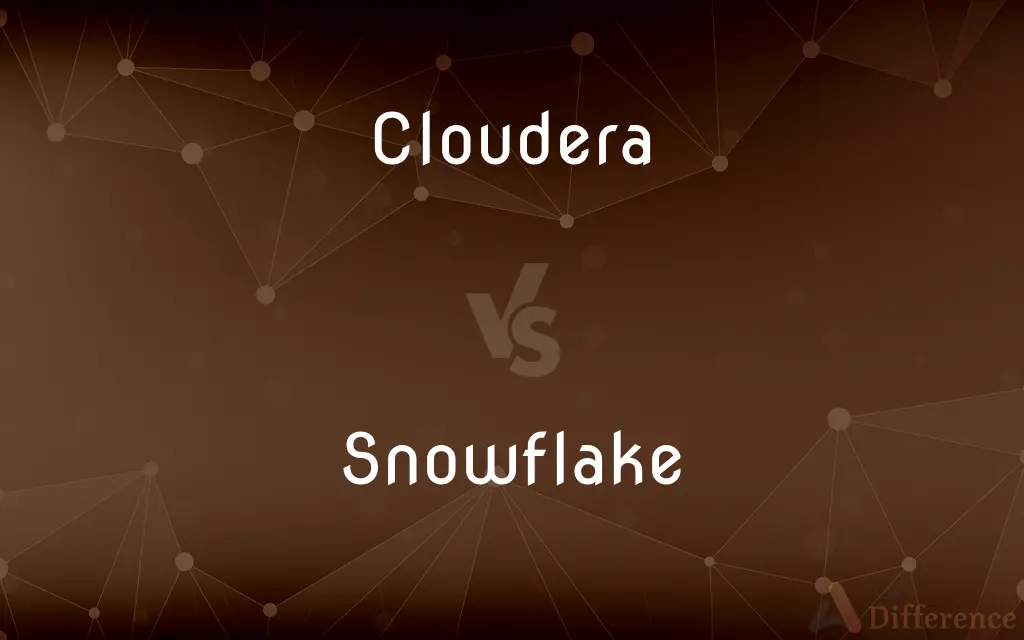Cloudera vs. Snowflake — What's the Difference?
Edited by Tayyaba Rehman — By Fiza Rafique — Updated on April 16, 2024
Cloudera offers a comprehensive suite for managing big data using Hadoop ecosystems, whereas Snowflake is a cloud-native data warehousing solution optimized for ease and scalability.

Difference Between Cloudera and Snowflake
Table of Contents
ADVERTISEMENT
Key Differences
Cloudera is primarily known for its data management and analytics platform based on Apache Hadoop, supporting batch processing of big data. Snowflake, on the other hand, is a SaaS-based data warehousing service that excels in handling and analyzing data using SQL, with a strong emphasis on scalability and performance.
Cloudera allows organizations to deploy their software on-premises or in a cloud environment, offering flexibility for data governance and security-sensitive operations. Whereas Snowflake operates exclusively in the cloud, offering seamless data storage, processing, and analytic solutions without the overhead of hardware management.
The architecture of Cloudera is designed to handle large volumes of data across distributed computer clusters, making it well-suited for enterprises with significant data infrastructure. Snowflake, however, uses a unique architecture that separates compute and storage, enabling users to scale services independently and cost-effectively.
Cloudera integrates with a wide range of Apache open-source projects, providing a versatile toolkit for data engineering, data warehousing, machine learning, and real-time stream processing. Snowflake does not provide native integration with these Hadoop-based tools but offers robust SQL support and integration capabilities with modern, cloud-native applications and ecosystems.
In terms of data security, Cloudera provides robust features including Kerberos-based authentication and fine-grained access control, suited for industries with high compliance requirements. Snowflake also ensures data security through always-on encryption and role-based access control, but it simplifies management with a cloud-centric approach.
ADVERTISEMENT
Comparison Chart
Primary Focus
Data management and analytics on Hadoop
Cloud-native data warehousing
Deployment
On-premises or cloud
Cloud-only
Scalability
Manages large volumes, scales with hardware
Scales compute and storage independently
Integration
Rich with Apache projects
High with cloud services and applications
Security
High, with detailed access controls
High, streamlined via cloud capabilities
Compare with Definitions
Cloudera
A platform supporting both on-premises and cloud deployment.
Cloudera can be installed in a company’s own data center.
Snowflake
A cloud-based data warehousing service that uses SQL.
Snowflake supports complex data analytics queries.
Cloudera
A software that provides a platform for data management, analytics, and machine learning using Hadoop ecosystem.
Cloudera is used by businesses to analyze large data sets.
Snowflake
A data solution that separates compute from storage.
Snowflake users can adjust computing power without affecting stored data.
Cloudera
An ecosystem with extensive security features.
Cloudera’s security protocols make it suitable for sensitive data handling.
Snowflake
A platform known for its dynamic scalability.
Snowflake can scale up resources during peak query times.
Cloudera
A tool for enterprise data engineering and storage.
Cloudera allows companies to store petabytes of data.
Snowflake
A service offering robust security measures.
Snowflake encrypts data at rest and in transit.
Cloudera
A solution for big data challenges incorporating a variety of Apache software.
Cloudera integrates with Apache Spark for real-time data processing.
Snowflake
A tool for modern data integration and real-time sharing.
Snowflake facilitates data sharing across different businesses.
Cloudera
Cloudera, Inc. is a US-based company that provides an enterprise data cloud.
Snowflake
A snowflake is a single ice crystal that has achieved a sufficient size, and may have amalgamated with others, then falls through the Earth's atmosphere as snow. Each flake nucleates around a dust particle in supersaturated air masses by attracting supercooled cloud water droplets, which freeze and accrete in crystal form.
Snowflake
A single flake or crystal of snow.
Snowflake
Any of several bulbous perennial plants of the genus Leucojum, native to Europe, having nodding white bell-shaped flowers.
Snowflake
A snow bunting.
Snowflake
(Slang) A person who is considered to be overly sensitive or too easily offended, especially as a result of believing himself or herself to be unique or special.
Snowflake
A crystal of snow, having approximate hexagonal symmetry.
Snowflake
Any of several bulbous European plants, of the genus Leucojum, having white flowers.
Snowflake
The snow bunting, Plectrophenax nivalis.
Snowflake
Someone who believes they are particularly unique and special.
Snowflake
Someone hypersensitive to insult or offense, especially a young person with politically correct sensibilities.
Snowflake
A type of lesion that appears as scattered white-brown spots under high magnification light microscopy.
Snowflake
Something that is unique in every presentation.
Snowflake
A Caucasian person.
Snowflake
(historical) Someone (usually white) who was opposed to the abolition of slavery (Missouri, 1860s)
Snowflake
To fall in the manner of a snowflake.
Snowflake
To arrange (data) into a snowflake schema.
Snowflake
A flake, or small filmy mass, of snow.
Snowflake
See Snowbird, 1.
Snowflake
A name given to several bulbous plants of the genus Leucoium (L. vernum, æstivum, etc.) resembling the snowdrop, but having all the perianth leaves of equal size.
Snowflake
A crystal of snow
Snowflake
White arctic bunting
Common Curiosities
What is Cloudera mainly used for?
Cloudera is used for managing and analyzing big data within a Hadoop ecosystem.
Can Cloudera be deployed in a cloud environment?
Yes, Cloudera can be deployed both on-premises and in a cloud environment.
How does Snowflake manage data scalability?
Snowflake manages scalability by separately adjusting compute and storage resources based on demand.
What makes Snowflake different from traditional data warehouses?
Snowflake’s architecture separates compute from storage, allowing independent scaling and cost efficiency.
Is Cloudera compatible with other Apache projects?
Yes, Cloudera integrates well with a range of Apache projects, enhancing its data processing capabilities.
What are the security features of Cloudera?
Cloudera offers advanced security features like Kerberos authentication and fine-grained access control.
How does Snowflake integrate with other applications?
Snowflake integrates smoothly with various cloud services and applications through APIs and connectors.
What type of companies can benefit from using Cloudera?
Companies that require robust data management and analytics capabilities, especially those with existing big data infrastructure.
Is Snowflake suitable for real-time data processing?
While Snowflake is highly efficient at data warehousing and analytics, it is less focused on real-time data processing compared to some other platforms.
How does Snowflake ensure data security?
Snowflake uses always-on encryption and role-based access control to secure data.
Can Cloudera be used for machine learning projects?
Yes, Cloudera can be used for machine learning projects as it integrates with tools like Apache Spark.
How does Cloudera handle data scalability?
Cloudera handles data scalability by utilizing distributed computing across clusters of computers.
Is there a pricing difference between Cloudera and Snowflake?
Pricing structures differ; Cloudera can involve significant upfront infrastructure costs if deployed on-premises, while Snowflake operates on a usage-based pricing model, potentially reducing initial costs.
What is a unique feature of Snowflake?
A unique feature of Snowflake is its ability to perform data sharing among different account holders.
What industries benefit most from Snowflake?
Industries that need flexible, scalable, and easy-to-manage data warehousing solutions benefit most from Snowflake.
Share Your Discovery

Previous Comparison
ACH vs. Check
Next Comparison
Heifer vs. CowAuthor Spotlight
Written by
Fiza RafiqueFiza Rafique is a skilled content writer at AskDifference.com, where she meticulously refines and enhances written pieces. Drawing from her vast editorial expertise, Fiza ensures clarity, accuracy, and precision in every article. Passionate about language, she continually seeks to elevate the quality of content for readers worldwide.
Edited by
Tayyaba RehmanTayyaba Rehman is a distinguished writer, currently serving as a primary contributor to askdifference.com. As a researcher in semantics and etymology, Tayyaba's passion for the complexity of languages and their distinctions has found a perfect home on the platform. Tayyaba delves into the intricacies of language, distinguishing between commonly confused words and phrases, thereby providing clarity for readers worldwide.
















































